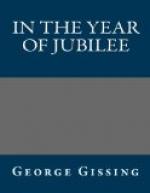At the end of the second week, early one evening, three persons came to him by appointment: his partner Samuel Barmby, Mr. Barmby, senior, and a well-dressed gentleman whom Mary—she opened the door to them—had never seen before. They sat together in the drawing-room for more than an hour; then the well-dressed gentleman took his leave, the others remaining for some time longer.
The promoted servant, at Mr. Lord’s bidding, had made a change in her dress; during the latter part of the day she presented the appearance of a gentlewoman, and sat, generally with needlework, sometimes with a book, alone in the dining-room. On a Sunday, whilst Nancy and her brother were away, the Barmby family—father, son, and two daughters—came to take tea and spend the evening, Mary doing the honours of the house; she bore herself without awkwardness, talked simply, and altogether justified Mr. Lord’s opinion of her. When the guests were gone, Stephen made no remark, but, in saying good-night to her, smiled for an instant—the first smile seen upon his face for many days.
Mary remained ignorant of the disease from which he was suffering; in the matter of his diet, she consulted and obeyed him, though often enough it seemed to her that his choice suited little with the state of an invalid. He ate at irregular times, and frequently like a starving man. Mary suspected that, on the occasions when he went out for half-an-hour after dark, he brought back food with him: she had seen him enter with something concealed beneath his coat. All his doings were to her a subject of ceaseless anxiety, of a profound distress which, in his presence, she was obliged to conceal. If she regarded him sadly, the sufferer grew petulant or irate. He would not endure a question concerning his health.
On the day which was understood to be Nancy’s last at Teignmouth, he brightened a little, and talked with pleasure, as it seemed, of her return on the morrow. Horace had written that he would be home this evening, but Mr. Lord spoke only of his daughter. At about six o’clock he was sitting in the garden, and Mary brought him a letter just delivered; he looked at the envelope with a smile.
‘To tell us the train she’s coming by, no doubt.’
Mary waited. When Mr. Lord had read the brief note, his face darkened, first with disappointment, then with anger.
‘Here, look at it,’ he said harshly. ‘What else was to be expected?’
‘Dearest Father,’ wrote Nancy, ’I am sorry that our return must be put off; we hope to get back on Friday evening. Of course this will make no difference to you.—With best love, dear father, and hoping I shall find you much better—’
‘What does she mean by behaving in this way?’ resumed the angry voice, before Mary had read to the end. ’What does she mean by it? Who gave her leave to stay longer? Not a word of explanation. How does she know it will make no difference to me? What does she mean by it?’




